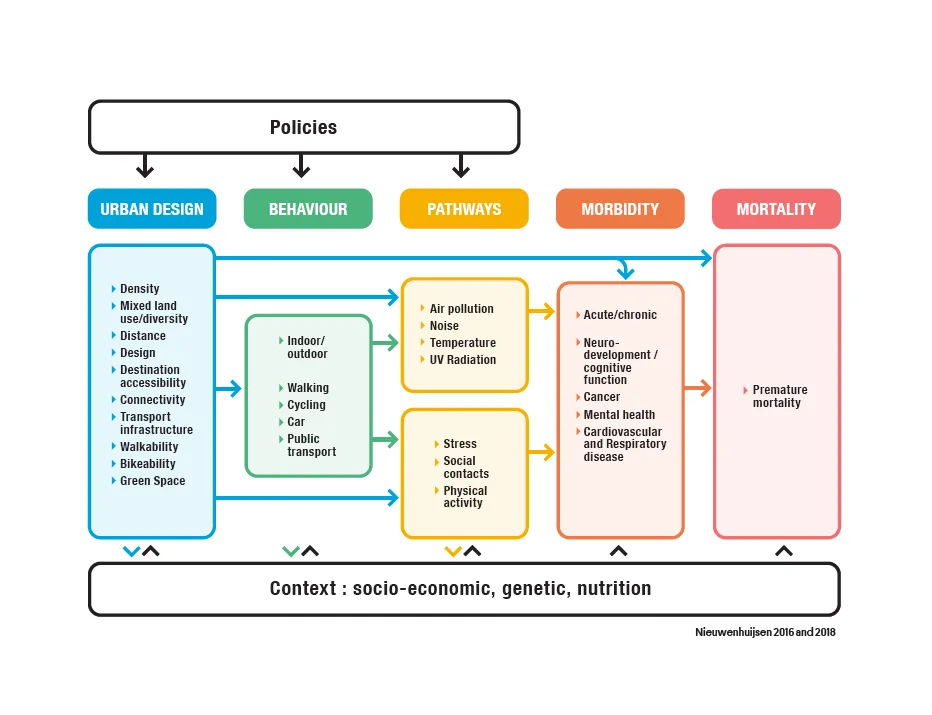Invited talks from renowned speakers

Meet the esteemed committee members and speakers participating in the conference.
Unfortunately we don't fully support your browser. If you have the option to, please upgrade to a newer version or use Mozilla Firefox, Microsoft Edge, Google Chrome, or Safari 14 or newer. If you are unable to, and need support, please send us your feedback.
We'd appreciate your feedback.Tell us what you think!
10-12 November 2026 | Sitges, Spain

Urban Transitions 2026 aims to promote healthy urban development by bringing together different disciplines working within cities. Meet world leading experts on housing, urban and transport planning, architecture, environmental exposure assessment, environmental epidemiology, physical activity, climate change, public health, circular economy and governance to discuss current challenges and solutions.
Cities suffer from many environmental, climate change and health problems. Poor urban and transport planning is part of the problem, but can also be part of the solution. There is great potential for improvement through targeted and integrated policies. However, the urban environment is a complex interlinked system. Decision-makers need enhanced understanding of the linkages involved, cities need better knowledge, and multi-sectorial approaches are needed to tackle the current problems.
Urban Transitions 2026 will address science and practice and provide pathways to low carbon, liveable, equitable and healthy cities.
Present your research at Urban Transitions 2026: Abstracts are invited for talks and posters to supplement the invited lectures by 8 May 2026.
Abstract deadline – 8 May 2026
Author notification deadline – 19 June 2026
Early booking and author registration deadline – 17 July 2026

Meet the esteemed committee members and speakers participating in the conference.

Present your research: abstracts are invited for talks and posters on the following topics by 8 May 2026:
Buildings and Housing
Transportation/Sustainable Transport Systems
Healthy Cities
Nature-Based Solutions and Ecosystem Services
Social Systems, Justice and Governance
Climate Action and Resilience
Circular Economy and Resource Management: Integrated approaches to food-water-energy and waste

Choose from a variety of sponsorship and commercial options to raise your profile and position your company as a thought leader in the community.
Cities are constantly changing, often attempting to reach environmental and health goals, such as Net Zero for carbon neutrality, Zero Waste cities for embracing circularity, Vision Zero to eliminate traffic deaths, or City Cancer Challenge to improve access to cancer care. While various policy options are usually available, sector-specific initiatives that target each goal separately are typically favoured, while multi-level approaches that concurrently address cross-sectoral needs are often overlooked. In fact, despite mounting evidence and growing urgency for cities to transition towards healthier and more sustainable urban environments, progress remains slow. This may be due in part to single-policy targets that enable relatively simple solutions to be implemented, but miss out on the opportunity to engage cities in more transformative solutions. Urban transitions involve policy shifts alongside structural, cultural, and institutional changes that unfold over time. They depend on a range of factors such as existing infrastructure, institutional inertia, and coordination among multiple stakeholders. The systems thinking approaches that are required to develop solutions that consider multiple benefits and tradeoffs, however, are complex to develop and to implement.
Urban Transitions is the conference for those who are keen to advance positive urban transformations, by bringing together interdisciplinary insights and generating the evidence needed to make these changes happen. Its goal is to present and integrate new understandings of the process of change, and of multiple benefits and trade-offs of alternative urban forms, to support the implementation of effective urban transitions.
Urban Transitions aims to explore these questions by bringing together interdisciplinary research and evidence that supports a systemic view on healthy and sustainable cities. It will bring together research and practice that builds a holistic case for healthy and sustainable cities, and demonstrates how change is possible and attainable. It will address issues in a wide range of areas that will show benefits, unintended consequences and processes of urban transitions. Some of these overlapping areas, in addition to cross-cutting issues such as complex systems, societal engagement, societal developmental goals and systems thinking.
This conference will be of interest to researchers, policy makers and practitioners in:
Urban planning
Architecture
Transport planning
Environmental science and exposure assessment
Climate change
Public health (epidemiologists, health impact assessment)
Citizens science
Social science
Policy and decision making

Urban Transitions is a broad scope, open access journal aimed at integrating urban planning, transport, environment, and health for healthier urban living. The journal is multidisciplinary in nature, and welcomes contributions from across the social sciences such as geography, planning, development, public health, safety science, transportation, and urban studies. Any submission reporting scientifically accurate and valuable research within these areas will be considered for publication following rigorous peer review. We welcome theoretical and practical research from all methodological approaches.
Researchers presenting at Urban Transitions are invited to submit full manuscripts to Urban Transitions the journal. Full journal information and submission instructions coming soon.

This conference is organised by Elsevier and supported by ISGlobal (Instituto de Salud Global Barcelona)
